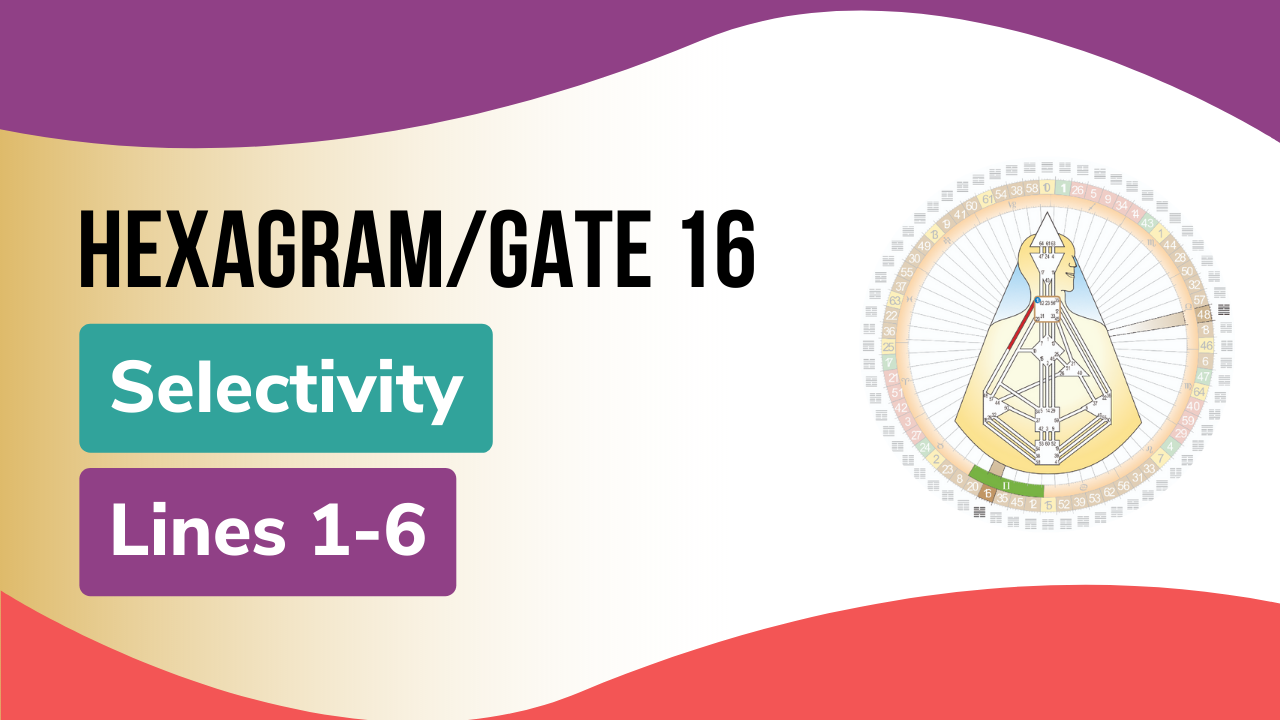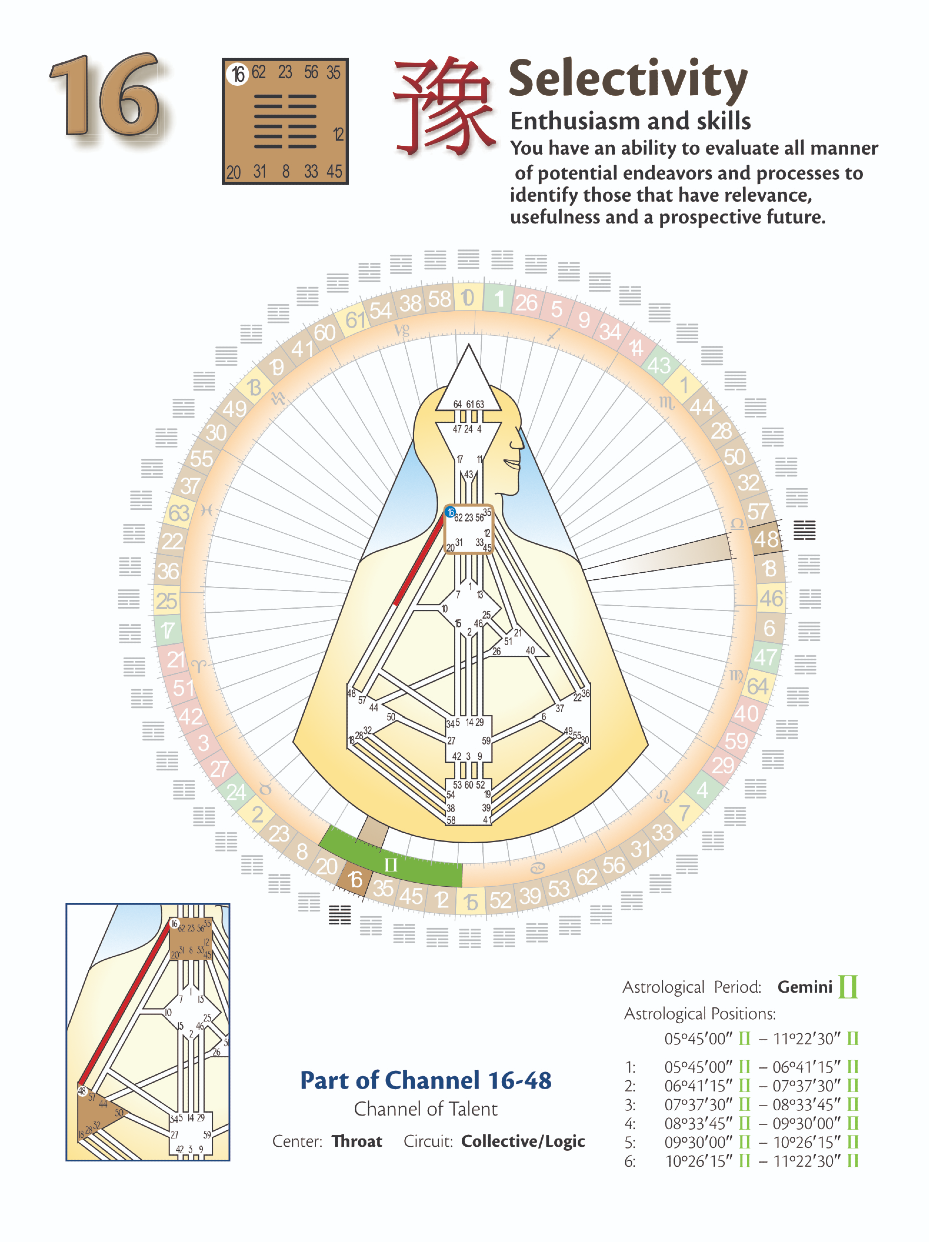Last time, we explored Hexagram 20, which showed us the power in stepping off the mental merry go round and being in the present moment. Now, the sun is moving into Human Design Gateway 16, which we call “Selectivity.”
We’re in a very particular area of the sky where the sun is going through a series of gateways that all have to do with the Throat Center. The first three that we’ve looked at (23, 8, and 20), have all been in what we call the Individual Circuitry, each one articulating, novel, individual forms of expression. And now, as we look to Human Design Gateway 16, we venture into the Collective Circuitry, specifically, the Collective Logic Circuitry.
With logic, one thing precedes another. There’s a logical progression. We put something into practice, and we expect a certain result. We have ideas and concepts, and we put them forward and seek to make them work well. So, logic has to be defined. It has to have parameters. If we’re going to do something, we want to make sure it’s going to work in the first place. And that’s the job of the 16.
It’s the Gateway of Selectivity, but it’s also the gateway of Skill and Enthusiasm. And these two things also follow a logical progression. You may have the skill, but do you have the enthusiasm to back it up, to follow through on your skill and make it work for you?
All of us have had a crackpot scheme at one time or another. We just get some crazy idea. It sounds like fun, let’s give it a shot. But, when we get into it, there’s one complication after another and it doesn’t go anywhere. So, the job of the 16th Gateway, with its selectivity, is to find out, is this just a crackpot scheme or does it have some level of confidence about it? Can we manage it? Will it work? Does it need a bunch of fine tuning? So, you have the enthusiasm on the one side, which tells you that it looks like fun, let’s go for it. And then you have the skills on the other side, which are employed to bring about the mastery, so that something really fine comes out of it all.
Let’s have a look at Human Design Gateway 16 line by line:
First Line: Pay Attention
The first line is called “Pay Attention: Enthusiasm can be aligned to the real needs of the moment or not.” In a sense it’s asking the question, are we going to go with this thing or not? Is it going to get my blessing? Do we need to tweak it a little bit or do we just nix the whole thing?
Having a clear grasp of what is confronting you requires presence, interest, and detachment. The first line here is being very watchful, very present in seeing what’s involved. But it also maintains a bit of distance and detachment, in order to see things objectively, critically.
Without this detachment, you can easily get involved in situations without always considering what’s really going on. You can miss out on a few of the relevant issues. You can get caught up in it all and put a lot of energy and resources into things that are never going to go anywhere.
So, the key here is to pay attention. See what it is that’s being presented. Recognize whether you are reacting to other people’s emotions, or if you’re acting from a place of clarity. There are a lot of people with a lot of emotional energy that want to pull you into things based on that emotional charge. But the Logic Circuitry is not attuned to emotion. It has nothing to do with emotion. Logic is about the facts.
Second Line: Being Watchful
Second lines always have this very natural, easygoing quality about them. And here the second line is called, “Being Watchful: Being objective and commenting clearly is important for you.” It’s about asking yourself, “What do I perceive about this thing? Does it have a natural movement to go forward? Is it going to get my blessing? Is it going to get my enthusiasm?”
You have the ability to see through to the merits of any scheme, both neutrally and critically. You’re not attached to it at all. In your natural way, you glance at it and see maybe it’s got potential, maybe not. You’re not just jumping on board right away. It’s a natural skill you have to judge any situation impartially.
The other side of this is that you express a pointed analysis that might easily dampen other people’s excitement. You can sometimes let the air out of the balloon without even knowing it. You give people your impartial point of view, but it’s a pointed analysis. And suddenly you’re pointing out potential failures that everyone else had missed, and it leaves them a bit deflated.
Third Line: Reforming
Here, the third line is called “Reforming: Delight comes in winning your own accomplishments.” You see your own way through, regardless of anybody else’s input, viewpoints, criticisms and excitements. That’s the thing with the third line. They’re always the first in. They’re always experimenting with stuff, and sometimes it just works out.
Attuning to your own enthusiasm, you engage to propel your life through any situation. You trust in your own enthusiasm. You take enthusiasm as an inside job. You have a sense that nobody’s going to approve of what you’re doing until you have a few successes under your belt.
Sometimes the fastest way to learn something is to make a mess of it. And that can very easily happen with the third line. Again, third lines are experimenters. Sometimes you’re just going to go for it. And sometimes it’s going to blow up in your face. But you’ll learn, you’ll see the way through. You have an enthusiasm for it, and the skill to adapt to it. You dust yourself off, and when you do the thing again, you’ll adjust how you go about it. You’ll enhance your skills.
Fourth Line: Guiding
The fourth line is called, “Guiding: Confidence in how you deal with life’s problems draws others to your side.” The key word here: confidence. You trust in your own skills. You see what’s involved. You want to guide the process, and get others in on it, show them what’s involved and how it’s going to work out.
It’s easy for you to give support and recognition to others, or you might ignore their offerings. It’s up to you. It can be great to have a team on your side where everyone is pushing in the same direction. But sometimes you don’t really need anyone else’s offerings. You might say, “It’s going to work anyhow, so leave it with me.” And your Type and Authority will always let you know whether you’re going to go it alone, or whether you want other people on board in the first place.
Your enthusiasm for combining efforts aimed at lofty goals will gather widespread support. When others see what you’re up to, that you’ve got the skills, you’ve done your due diligence, you’ve got the juice for it, you’ve got the right team on board, they’re going to want to join you.
You’ll attract support, but, if you push to get ahead, you can fail to acknowledge any assistance you get or need. Because it’s you who’s leading the charge, you don’t necessarily want interference from other people who might interrupt your progress. This can lead you to fail to acknowledge those times when you actually do need some support.
Fifth Line: Resisting
Fifth lines are always in the potential leadership role. They are the guides, the visionaries. They have the overview of everything. And here, the fifth line is called “Resisting: An unwillingness to encourage yourself or others to move on in life.”
There can be a “What’s the point?” attitude here. A feeling that, if you’re not given a clear picture of the potential result, then you’re not going to give your input and encouragement.
You tend to avoid endorsing things if you consider them unattainable. You can see potentials in everything. You are the visionary. But there’s an unwillingness to go ahead with any grand visionary ideas unless you’re actually going to be able to pull them off. Again, we’ve all got crackpot schemes sometimes. But the fifth line is very unlikely to endorse a crackpot scheme unless there’s enough backing, enough resources, enough enthusiasm and skill to actually make it become a reality.
Sixth Line: Reassessing
The sixth line is called “Reassessing: Objective evaluation of realistic goals.” As I said in the first place, the whole stream of logic is underfunded energetically. So, the 16th gateway says, “let’s put the brakes on this thing until we’re absolutely 100% percent clear that the talent is actually going to accomplish something great. Let’s just hold off until we can see real results.”
You either see things as they really are or get flustered by others’ expectations and lose clarity. Sixth lines have a sense of responsibility for everybody. So, when others are pushing you to do something, and expecting you to make things happen, you have to be very careful about whether or not you really want to get involved. Are you really enthusiastic about it? Do you really know you have the skills to see it through?
You accurately envision everyone’s take on what’s possible and adjust accordingly. The sixth line has the ability to weigh things up quite clearly, to see who and what is involved, what resources are available, and where the whole thing is headed. And the other side of this is that when you expand on any concept regardless of potential outcomes, you’ll eventually become disenchanted. When you put your energy into something and it turns out to be a disaster, it will wear on you to the point where you feel you have to take a step back.
The 16 has a very vital role to play. We all know the feeling of being enthusiastic, when something just gets our attention, and we want to go for it. But, while it’s great to be excited about something, it’s another thing to actually put it all into motion. And that is the function of the 16th Gate: to see whether anything’s going to go forward or not.
So, there we are, that’s Human Design Gateway 16. We’ll check in again soon. In the meantime, if you’d like to learn more about how your Design informs and shapes your life, get your Free Human Design Report today.




